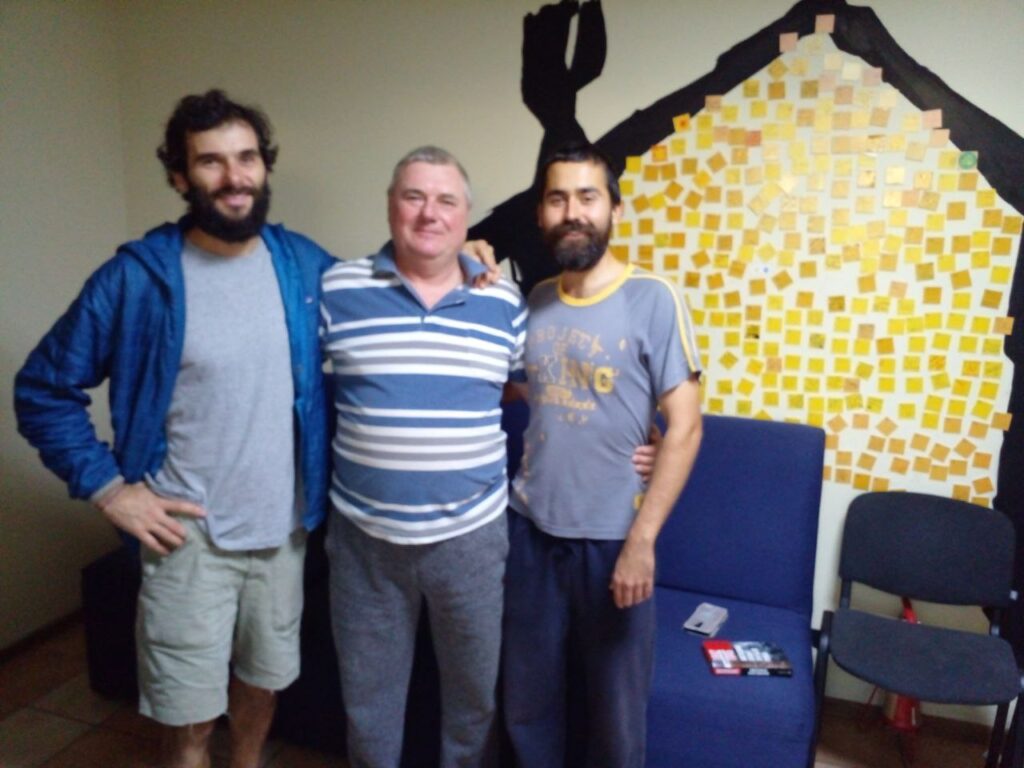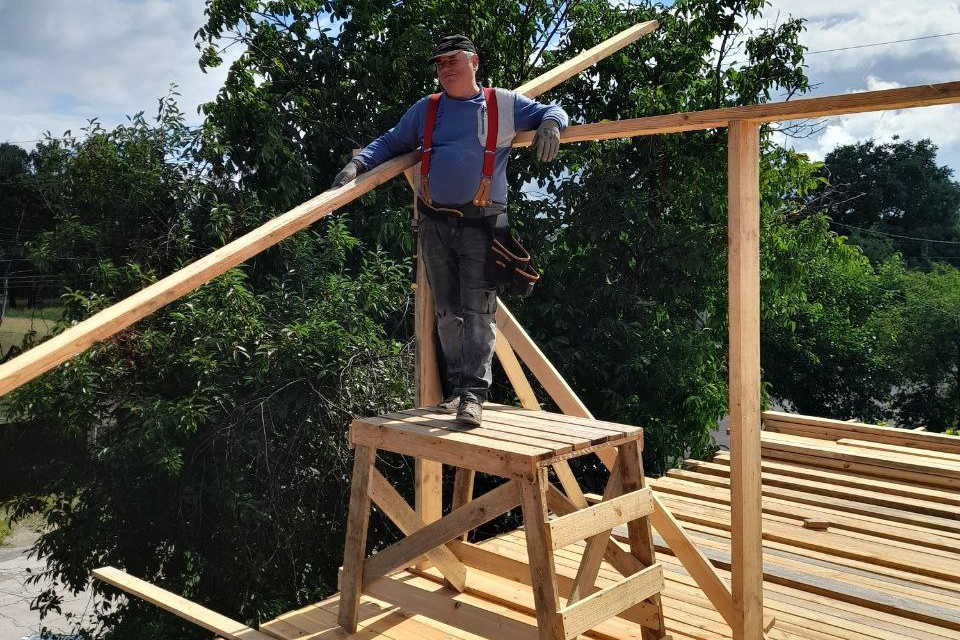This interview was originally published in Ukrainian by Educational Human Rights House Chernihiv.
Oleksandr worked as a locomotive driver at the Ilyich metallurgical plant (located in Mariupol) for 40 years, and now lives with his mother in Kyiv. During these years, he dreamed of a house by the sea with vineyards and a place for fishing.
Oleksandr made his dream come true — he bought a plot of land near Berdyansk (Zaporizhzhia Oblast), built a house in 7 years, planted trees and grapes, retired and just wanted to enjoy the results of his work. However, after February 24, 2022, his life changed like the lives of millions of other Ukrainians.
At first, Oleksandr and his mother decided to stay in their village near Berdyansk — he recalls the moment when the evacuation corridor was opened (in mid-March 2022) and people started to leave Mariupol: “Everyone came to see me – friends, acquaintances. My mother and I put a large pot on the wood-burning stove every morning, there was no more gas, I kept the chickens – we took out the chicken, cooked the soup… We knew that people would come.”
The road to Kyiv: the conflict at the checkpoint
Oleksandr together with his mother and a family of friends, left Berdyansk, at that time already occupied territory, for Kyiv on April 8, 2022. They had to travel almost 200 kilometres and 17 occupation checkpoints, at each of which they were stopped, checked and searched.
Before leaving for Kyiv, Larin helped his friends to evacuate. At one of the checkpoints, at the entrance to the village where Oleksandr’s house is located, he was stopped by occupying Russian forces to check his documents – a small dialogue between them started, which turned into a life-threatening episode.
According to Oleksandr, after one of the Russians saw that the car had Mariupol licence plates, he started a tense conversation about the Azov regiment. “So you love Azov? Do you like nationalists?”
Oleksandr did not tolerate insulting remarks about the soldiers of the regiment and came to their defence – saying they are simply defending their home.
Larin’s passport had already started to disappear into the hands of the Russians, while another Russian approached the car.
According to Larin, the situation was defused by his grey hair and status as a pensioner.
Educational Human Rights House Chernihiv says that this is a common tactic – to create the appearance of a frank discussion to identify people who are against the Russian occupation of Ukraine, and then eliminate them.
It was after this incident that it became clear to Larin that staying in his village was not an option. He decided to go to Kyiv.
Dobrobat and rebuilding homes
After Oleksandr reached the capital, which at that time was already experiencing a problem in transport, he was called to help medics find and deliver medicine for those who remained in the city:
“I arrived here, and immediately my daughter told me that I need to help here in Kyiv – no transportation was available – so I need to bring medicine.”
Later, his daughter enrolled him in Dobrobat, a volunteer construction organisation that helps restore housing and social facilities in territories liberated from the occupiers.
At first, Oleksandr helped with the reconstruction of settlements in the Kyiv region including Zagaltsi, Borodyanka, Irpin, and Gostomel.
Between June and November 2022, Educational Human Rights House Chernihiv hosted about 400 “Dobrobat” volunteers from all over Ukraine at its premises. Dobrobat volunteers worked to repair damaged houses in Kolychivka village and the neighbouring villages Yahidne and Ivanivka. Together, they provided about 150 residential houses with emergency repair work, including clearing rubble, fixing of roofs, and installing new windows.
EHRHC provides partnership support to Dobrobat — volunteers have the opportunity to live in the premises of the House in Kolychivka village. Oleksandr remembers his stay in Kolychivka with warmth, even though he worked with the terrible consequences of the war — he says it’s all because of the people who energised him and created the atmosphere.
“The most pleasant thing is, of course, people who say ‘thank you,'” says the man.
In addition to Ukrainians, volunteers from Poland, the USA, Denmark, Australia, and Romania also came to rebuild Yagidne — Oleksandr most remembered Machei Joseph, a lawyer from Poland who came to help and learn the Ukrainian language.

According to Oleksandr, there were three participants of Dobrobat in Yahidne in 2023, but despite this, even as a small group, they were able to build four houses from scratch.
The biggest problem that Oleksandr faced during volunteer reconstruction was transport, buses were not always operating.
“My [car] is standing there – I loaded eight people into it, two people were riding in the trunk,” Oleksandr says with a smile.
“In Kolychivka, which is good, there are no daily trips,” says the man.
“The conditions are, of course, excellent. You come after work – there is a shower, you can always drink coffee, have something to eat… I was going to join your lectures, but somehow it didn’t work out…”.
Now he is waiting for his wife, who should soon return from abroad, so that he can continue to rebuild settlements and create a new future for Ukraine and Ukrainians.
Oleksandr Larin received urgent support from Educational Human Rights House Chernihiv within the framework of the ESU (Emergency Support Ukraine) programme. Support included direct assistance to meet urgent and basic needs related to safety and safe living conditions as well as for his family. As a result, Oleksandr was able to continue to provide humanitarian aid to those whose households were damaged or destroyed, continuing his activities in Dobrobat.





